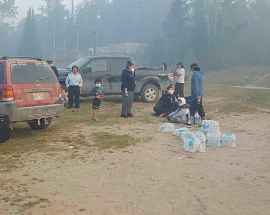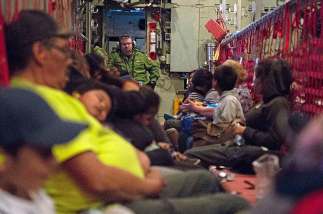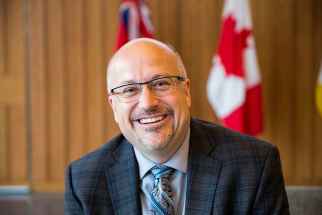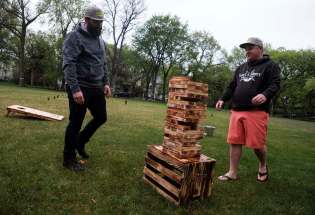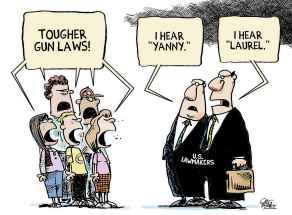Fire evacuees in Winnipeg describe community ‘in shock’
Read this article for free:
or
Already have an account? Log in here »
To continue reading, please subscribe:
Monthly Digital Subscription
$0 for the first 4 weeks*
- Enjoy unlimited reading on winnipegfreepress.com
- Read the E-Edition, our digital replica newspaper
- Access News Break, our award-winning app
- Play interactive puzzles
*No charge for 4 weeks then price increases to the regular rate of $19.00 plus GST every four weeks. Offer available to new and qualified returning subscribers only. Cancel any time.
Monthly Digital Subscription
$4.75/week*
- Enjoy unlimited reading on winnipegfreepress.com
- Read the E-Edition, our digital replica newspaper
- Access News Break, our award-winning app
- Play interactive puzzles
*Billed as $19 plus GST every four weeks. Cancel any time.
To continue reading, please subscribe:
Add Free Press access to your Brandon Sun subscription for only an additional
$1 for the first 4 weeks*
*Your next subscription payment will increase by $1.00 and you will be charged $16.99 plus GST for four weeks. After four weeks, your payment will increase to $23.99 plus GST every four weeks.
Read unlimited articles for free today:
or
Already have an account? Log in here »
Hey there, time traveller!
This article was published 24/05/2018 (2753 days ago), so information in it may no longer be current.
The smoke in Little Grand Rapids was so thick that people couldn’t see the sun in the middle of the day.
The air was thick with ash and it was tough to breathe, said Paul Duck, one of more than 1,000 fire evacuees brought to Winnipeg from two fly-in communities. Since Tuesday, members of Duck’s community have been flown into the city in batches, while some remain stranded.
The out-of-control fire has torched 20,000 hectares of land near the only place he’s ever called home: Little Grand Rapids First Nation. It is still burning.
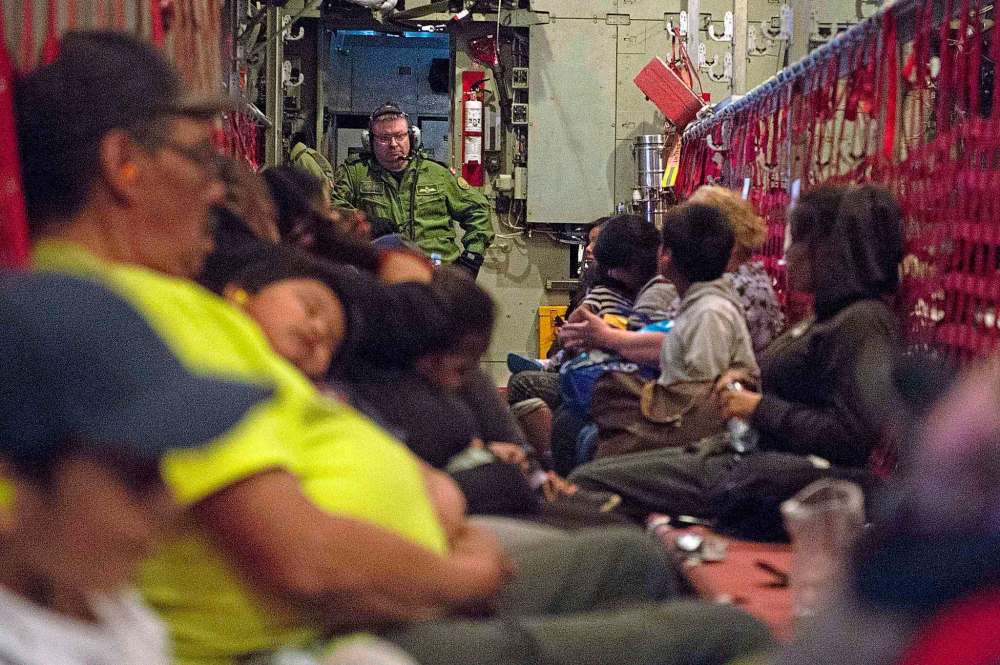
“Everybody is in shock. The last we saw, there was still some homes standing up. But it was hard to see because there was so much smoke. It was like a meteor just hit,” Duck said.
Standing outside one of the Winnipeg hotels where the Red Cross has arranged rooms for evacuees, Duck said he’s concerned about what, if anything, will be left of his home when he returns. A woman from Little Grand Rapids walked over and told him 21 homes have burned to the ground.
Duck shakes his head. If true, the loss of 21 homes is a big hit for a community that already has a housing crisis.
“We’ve been dealing with a housing crisis for a long time. I don’t know how they’re going to work this out now. We’ll just have to see how it will be when we go back home,” he said.
Duck was in the first group of evacuees flown into Winnipeg, on Tuesday. He came on an early flight, accompanying many of the community’s most vulnerable members: elders, children and those with medical conditions.
Drug fears
OTTAWA — Federal and provincial politicians worried Thursday about whether officials are doing enough to steer this week’s wildfire evacuees away from Winnipeg drug dealers.
During last August’s evacuation of Island Lake, the Red Cross placed residents in hotels across Winnipeg, where some claim the city’s drug dealers plied young people with free samples of methamphetamine to get them hooked.
OTTAWA — Federal and provincial politicians worried Thursday about whether officials are doing enough to steer this week’s wildfire evacuees away from Winnipeg drug dealers.
During last August’s evacuation of Island Lake, the Red Cross placed residents in hotels across Winnipeg, where some claim the city’s drug dealers plied young people with free samples of methamphetamine to get them hooked.
Just this week, a small group arrived in Ottawa from the Island Lake region down to Winnipeg and across Ontario. They’re seeking a treatment centre to deal with an uptick in deaths, suicide and child-welfare apprehensions.
Meanwhile, an Island Lake band councilor claimed a known sex-offender had been housed alongside evacuees in the RBC Convention Centre, leaving grandmothers to take shifts through the night to make sure their children don’t get preyed upon.
Others complained about being dispersed throughout the city away from family members, including those with medical needs, while some said they were turned away when offering to translate at the slow-moving registration table.
Canadian Red Cross spokesman Jason Small said his officials are working to make sure things go smoothly for the evacuees, but wouldn’t get into specifics. “A lot of it’s the small, little-detail things,” he said Thursday morning. “We certainly have learned a lot.”
Indigenous Services Canada said officials have been co-ordinating “all essential supports” with chiefs and councillors “including mental health services.”
ISC Minister Jane Philpott said she’s working with the Red Cross and others “to make sure that all issues in terms of cultural safety are addressed and that people are being well cared for.”
“We know that there were some issues in the evacuation centres last year in Winnipeg. We have taken lessons from that.”
Liberal MLA Cindy Lamoureux raised a similar concern in the provincial legislature on Thursday; the ministers noted that the evacuation centre is co-ordinated federally.
The Red Cross is undergoing a five-year review with any First Nation in Manitoba interested in developing emergency plans, so evacuations are done in culturally sensitive ways that use locals’ skillsets. That review, funded by Ottawa, started with debriefing sessions with Island Lake communities.
dylan.robertson@freepress.mb.ca
As much as he felt he should stay behind and help fight the fire, he thought he might best serve his community by helping the elders get settled in Winnipeg. He’s also been co-ordinating a donation drive with his sister, Catherine Duck, who lives in the city.
He says the situation has been incredibly tough on the community, especially children, and many people didn’t want to leave. But when the wind shifted and the First Nation was under siege from the flames, Duck says many people felt they’d been abandoned.
“It happened so fast and at the last minute. Just, ‘Hey guys, everybody has to evacuate immediately. Leave everything behind, just grab what you can grab and go.’ There was a lack of preparedness. I think the evacuation should have been called right away,” Duck said.
On Wednesday, as hundreds of residents piled into the local school to wait for planes to fly them to safety, Morgan Owen said the gym was so hot and smoky it was almost unbearable.
“(Outside), it was like night time during the day, ash falling all over… The smoke would waft into the gymnasium. They kept telling people not to go outside. There was a lot of heat, body heat and smoke filling in there. Most people stayed up the whole night. I didn’t get any sleep,” Owen said.
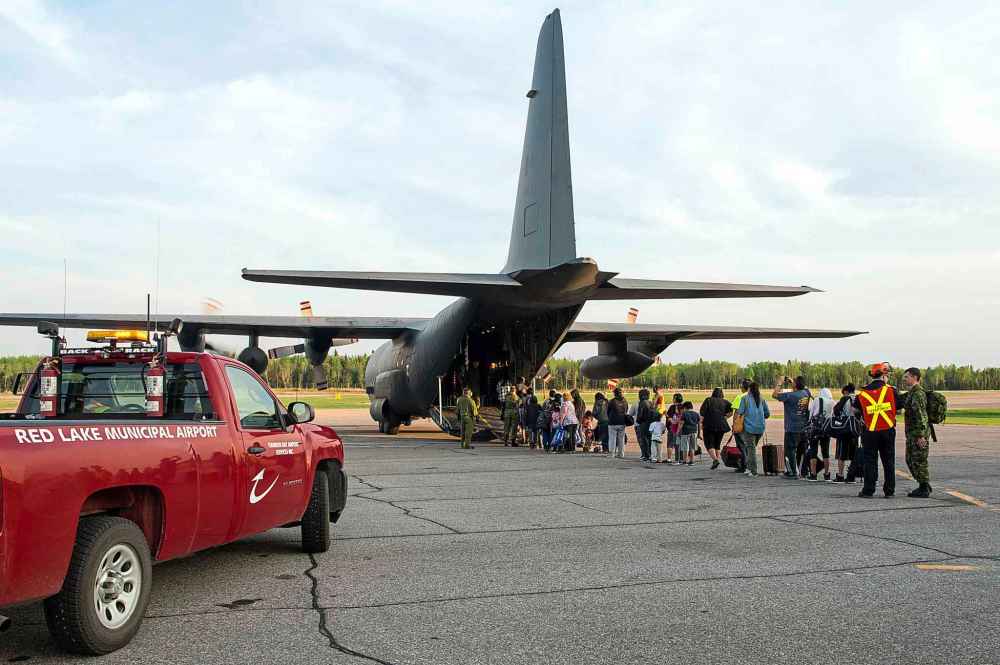
When asked if he’s scared to see what’s left of his community when he goes back home, Owen shook his head, saying quietly, “I don’t know. I don’t know what to say.”
He paused, before adding, “Out in the bush, the trails I walk around every day, they’re gone.”
That sentiment was echoed by Duck, who said he’s concerned not only for his community, and the homes and buildings lost, but also the surrounding environment and animals.
“It’s just very disappointing and hurting… the way all the trees are gone now. It’s upsetting. Where are we going to go? What about the animals? Those are things you think about,” he said.
“The moose, the bears, the squirrels, you name it. All the animals we survived on, lived on, all the green and the trees, the environment, gone away.”
ryan.thorpe@freepress.mb.ca
@rk_thorpe

Ryan Thorpe likes the pace of daily news, the feeling of a broadsheet in his hands and the stress of never-ending deadlines hanging over his head.
Our newsroom depends on a growing audience of readers to power our journalism. If you are not a paid reader, please consider becoming a subscriber.
Our newsroom depends on its audience of readers to power our journalism. Thank you for your support.


